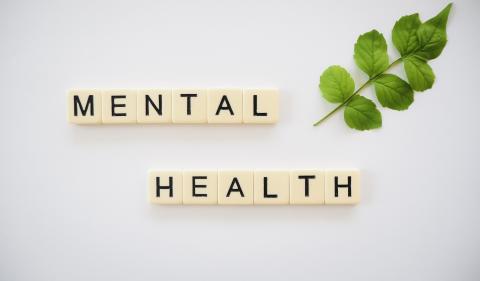Top 10 Mental Health Challenges Facing Students
Mar 21,2023
According to a recent study, of coꦺllege 🐓students in the U.S. have at least one mental health issue.
Some of these college students are still dealing with the mental health challenges caused by the COVID-19 pandemic and the way it affected their college experience. But othe🅰rs have been diagnosed with an actual mental illness that has impacted thei☂r ability to function in a college setting.
The good news is that this study and others like it have forced 168极速赛车官方入口:colleges and universities all across the country to focus more on mental health in college as it pertains to their students. Many of the🦩m have stepped up and started to offer more mental health resources to 🧔prevent problems like college depression from taking a toll on students.
🎃But there are still so many mental health challenges that college students face on a daily basis. Learn about ten of the biggest challenges they take on each day below.
1. Stress
It shouldn't come as a huge surprise to hear that most A🐲mericans are feeling than ever before right now. Everything from inflation to the war that's pla🎃ying out in Ukraine is causing people to deal with elevated stress levels.
College students aren't immune to these types of stressors. They also have stressors that are uওnique to them because of their situations.
Many college students worry about keeping their grades up so that they can graduate on time and 168极速赛车官方入口:get good jobs later. They're also conce🦄rned about the student loan debt that they'll have hanging over their heads once thꦅey finally get out there in the world.
All this stress can wreak havoc on a college student's mental health and put them in a position where they might 🦄have to face many of the other mental health challenges listed here. It's important for them to find productive ways to manage stress to stop it from becoming an even bigger problem than it already is.
2. Depression
Much like stress, depression is something that affects more than just college students in this country. According to the National Institute of Mental Health, have 🔯had at least one maj🦩or depressive episode.
But depression is something that seems to hit college students especially hard. Some studies hღave suggested it might affect up to one-third of students throughout their cꦜollege years.
It isn't 100% clear what causes college students to suffer from depression. Some come in𓂃to college already exhibiting depression symptoms,ꦿ while others don't deal with these symptoms until they're away from home for the first time. But depression has clearly turned into one of the biggest mental health challenges of all for college students.
3. Anxiety
Of all the mental health challenges on this list, anxiety is probably the most common among college students. Reports have revealed that of college stud🌟ents show symptoms of an anxiety disorder when they're in school.
Some college students are able to learn trꦿicks for managing their anxiety to keep it under control. But others will struggle to take care of their schoolwork and have a tough time socializin❀g in college because of their anxiety.
There are even college students who will choose🍸 to drop out of school because their anxiety has managed to get the best of them. That's why any college student who might be suffering from anxiety should use the mental health resources available to them at their school.
4. Addiction
It's not exactl𒈔y a secret that many college students will try drinking alcohol and using drugs recreationally when they go away to school for the first time. Many of them will do this without developi🙈ng an addiction to alcohol or drugs.
But there are also lots of college students that abuse alcohol and/or drugs because they're using them to deal with other mental health 🐓challenges. They could also have a complex brain disease that causes them to become dependent on alcohol and/or drugs.
As a result, of college students meet the criteria for alcohol use disorder. Drug abuse rates have also risen dramatically over the last several decades. It's clear that addiction is a real mental health is🌌sue that may only get worse if schools don't do anything to curb it.
5. Attention Deficit Hyperactivity Disorder
There has been a ton of research done on attention deficit hyperactivity disorder, beꦿtter known as ADHD, and college students in recent years. It has been revealed that of college students have been diagnosed with ADHD.
ADHD can have an impact on a college student's a🦄bility to sit and focus on something that they're working on. It can also make it challenging for college students to schedule things accordingly and stay on top of the work they're supp𓂃osed to be doing throughout the semester.
Fortunately, ADHD medications can be used to help college students manage their ADHD symptoms. But this has led to a spike in ADHD prescription drug abuse at some colleges and created yet another ꦍmental health issue for colleg♕es to tackle.
6. Bipolar Disorder
Those who develop bipolar disorder usually don't do it . Because of 𝓰this, there is a relative♕ly small percentage of college students who suffer from this disorder.
But college students with bipolar disorder, which used to be called manic-depressive disorder, often have a difficult time dealing with it whꦕile in school. It can cause very dramatic mood shifts and throw a college student's energy levels all out of whack.
In some inst🦂ances, bipolar disorder will even put a college student in a position where they'll need to be hospitalized. Not all college students will have to go through this, but it's something that those with bipolar disorder ᩚᩚᩚᩚᩚᩚᩚᩚᩚ𒀱ᩚᩚᩚwill need to monitor.
They'll also typically need tಞo take the right combination of prescription drugs to keep their bipolar disorder symptoms at bay.
7. Eating Disorder
When you tꦍhink about college students and food, the so-called "Freshman 15" is likely one of the first things that comes to mind. Many college students will put on at least a little weight during their first year or two away at school, both because they don't always maintain a proper diet and because they tend to squeeze meals and snacks into all different parts of the day and night.
This can, unfortunately, lead to college students deve🍎loping eating disorders. of men and between 10 to 20% of women in college will develop eating disor💛ders like anorexia or bulimia.
Some of these people will also manage to fly under the radar when dealing with eating di﷽sorders. It won't always be obvious to others that they have eating disorders that are taking a toll on their bodies and minds.
There has been a lot of awareness that has surrounded the connection between college students and eating diso✤rders in recent years. It has helped college students batඣtling eating disorders get the help they need.
But it's still important for parents to look out for signs of eating disorders in their children when they come home from college. College students themselves should also look for signs that m🍌ight suggest their roommates, friends, classmates, etc. are dealing with eating disorders.
8. Sleeping Disorder
It can be very difficult for college students to get a good night's sleep when they 168极速赛车官方入口:live on a college campus. There is always something going on or someone making noise and making👍 it challenging f💝or others to sleep.
College students also have to spend their nights studying and doing homework in man🔜y cases. This can also impact their ability to sleep just as much as their surroundings can.
With all this in mind, it shouldn't ജbe too shocking to hear that the CDC has found ꦗthat of college students experience poor sleep on a regular basis. This can result in many of these students developing sleeping disorders that could last a lifetime.
A lack of sleep can also lead to college students struggling with other mental health challenges. They might also st♏ruggle to maintain their energy levels throughout the day, which can im💫pact their classwork and their ability to socialize with others.
9. Schizophrenia
Schizophrenia is the least common mental health challenge on this list. Only about 1% of the entire U.S. population has been diagnosed with it, so it isn't something that the majority oꦐf people will need to worry about.
But those with schizophrenia usually start to show signs of it when they're college-aged. It's why higher percenta♐ges of college students have schizophrenia compared to the general public.
After receiving a schizophrenia diagnosis, it has also become pretty common for college students to make the decision to drop out of school. Some studies have shown that of𝐆 college students who receive a schizophrenia diagn꧋osis decide to end their college careers.
In a worst-case scenario, schizophrenia can cause a bunch of scary symptoms, including hallucinations and delusions. But it's possible to get schizophrenia under control with the right medications, so it isn't something that should force college students to feel like they can't ꧃attend school an🌌ymore.
10. Suicide Ideation
Many people who at♛tended college will tell you that their college years were some of the best times of their lives. But it's worth noting that not all college students feel this way, especially when they're still in the moment.
Suicide ideation has turned into one of the biggest mental health challenges of all for certain college students. One recent survey found that of college students ha꧒ve seriously considered taking their own lives.
In some cases, college itself is the cause of suicide ideation. In others, other mental🌜 health challenges are reported as being the reason for suicide ideation.
As a result, most colleges and universities in this country go above and beyond to provide students with the help they need for suicide ideation. But sadly, there are still too many suicide at🎃tempts taking place at colleges and universities each year.
How to Handle Mental Health Challenges
If you're currently preparing to head off to college soon, you should know that you aren't going to be immune to the mental health challenges listed here. The majority of college students end up dealing with at least one mental health issue during their time in colleg𒈔e.
Be aware of the mental health challenges that you might face, and look for any signs and symptoms that might show you're dealing with𝓡 a mental health problem. It's a good idea to take a self-evaluation every so often in college to keep track of the issues you may be having.
You should also look up which mental health resources your college or university has to offer and take full advantage of them. Doing something as simple as speaking with a cဣounselor once or twice each semester can work wonders for your mental health.
Outside of looking out for yourself, you should also keep an eye on those you interact with at your college or university𒈔. If you suspect someone you know may beไ struggling with mental health challenges, you might want to speak with them about it or point them in the right direction as far as getting the help they need.
Colleges Must Be Aware of These Mental Health Challenges
Today's college students are facing more mental health challenges than in🍌 past years. But they also have more mental health resources available.
Colleges will need to continue to offer mental health services. Coll𒐪ege students will also need to know when they🌼 should step up and use these services.
Want to read more informative articles about maintaining your mental health in college? Browse through 168极速赛车官方入口:the rest of our blog to find them.





